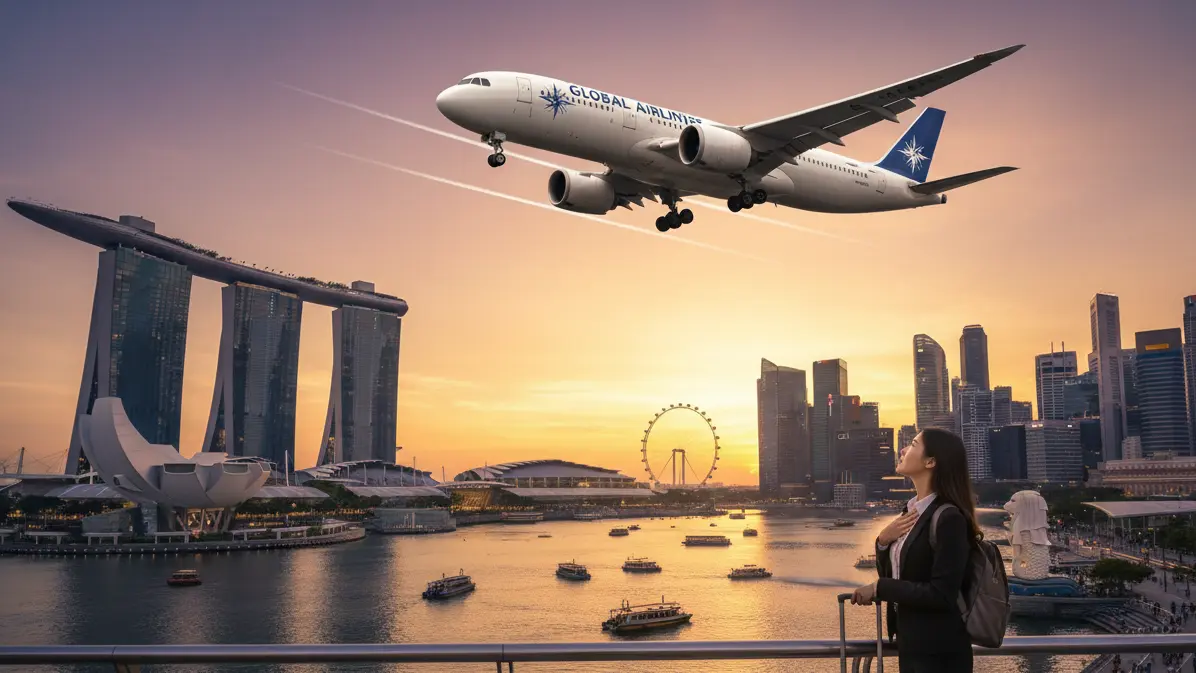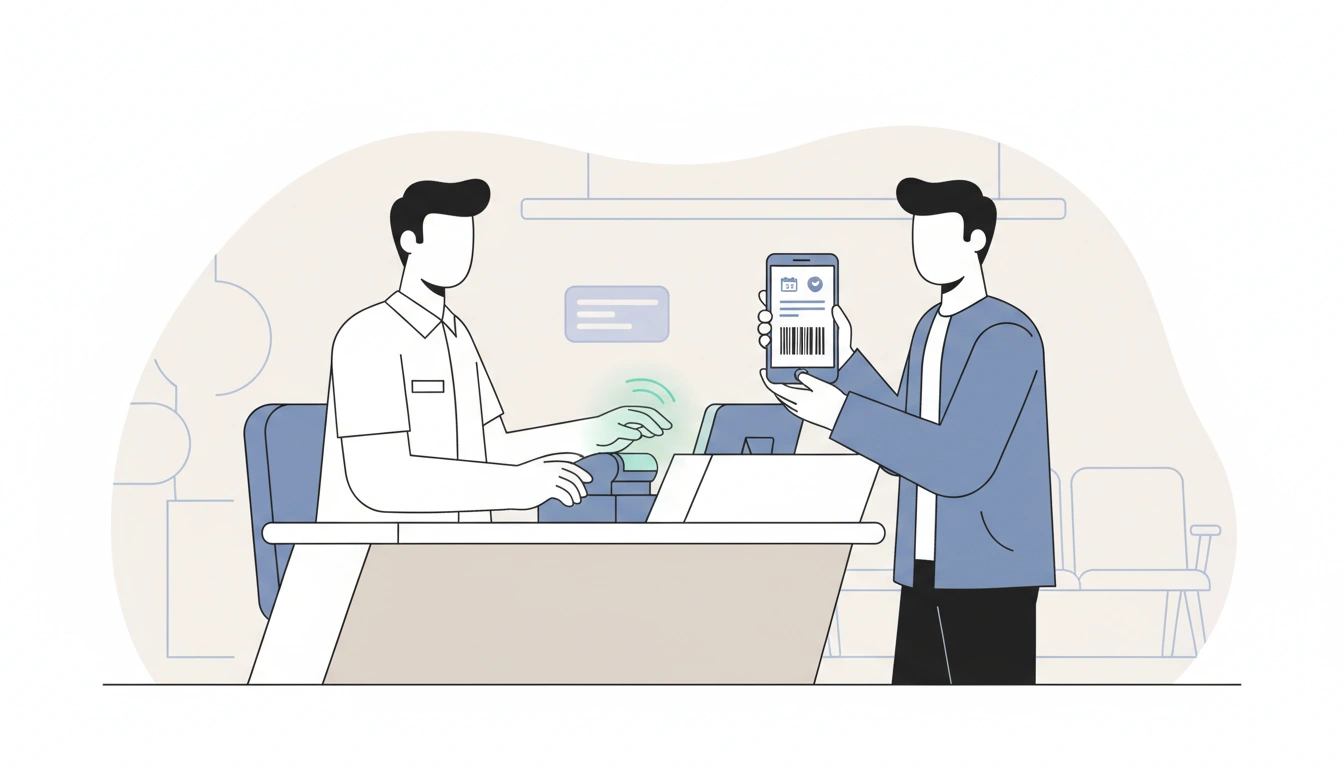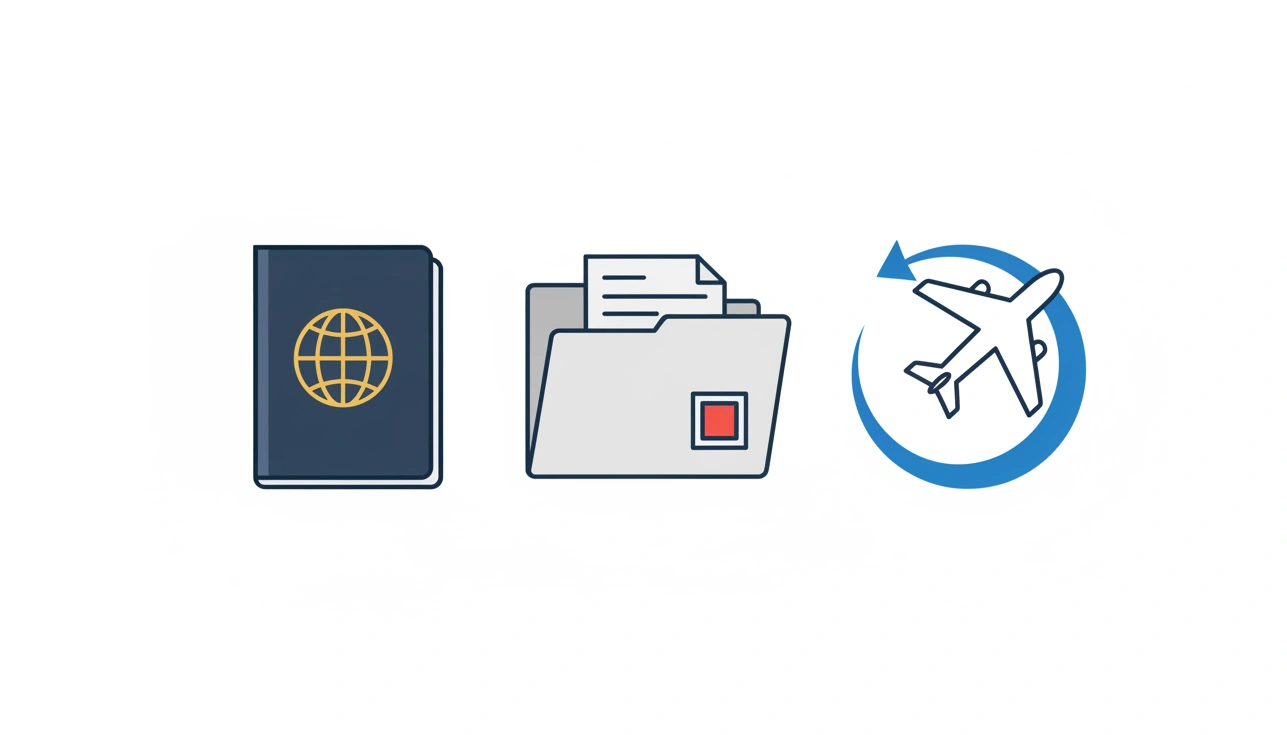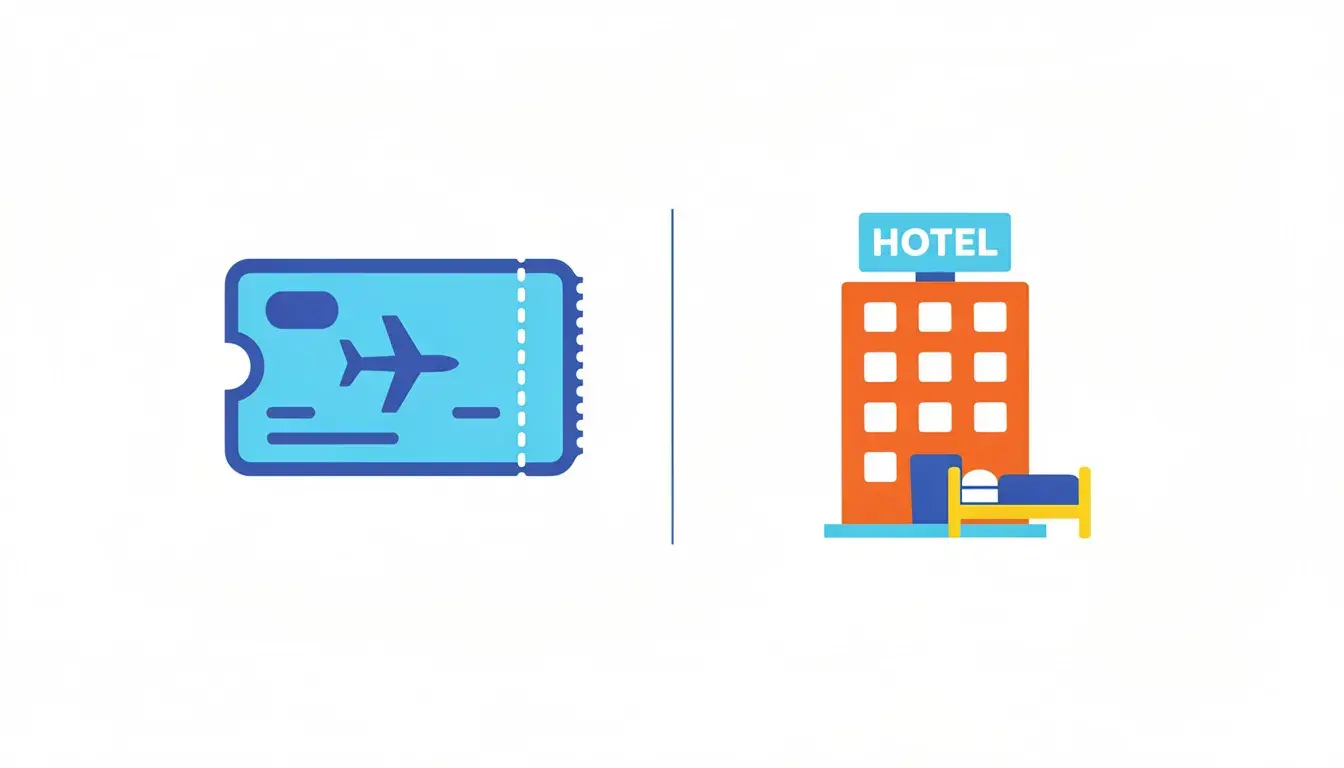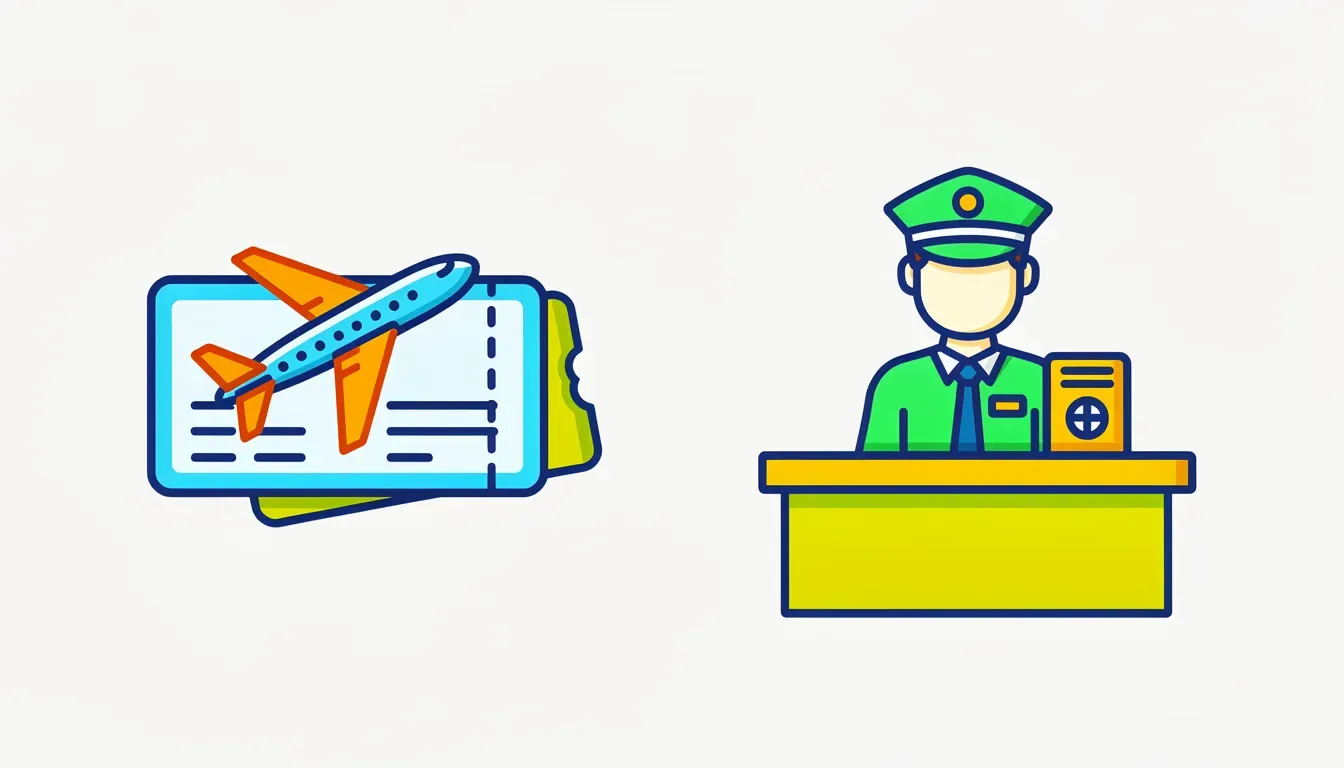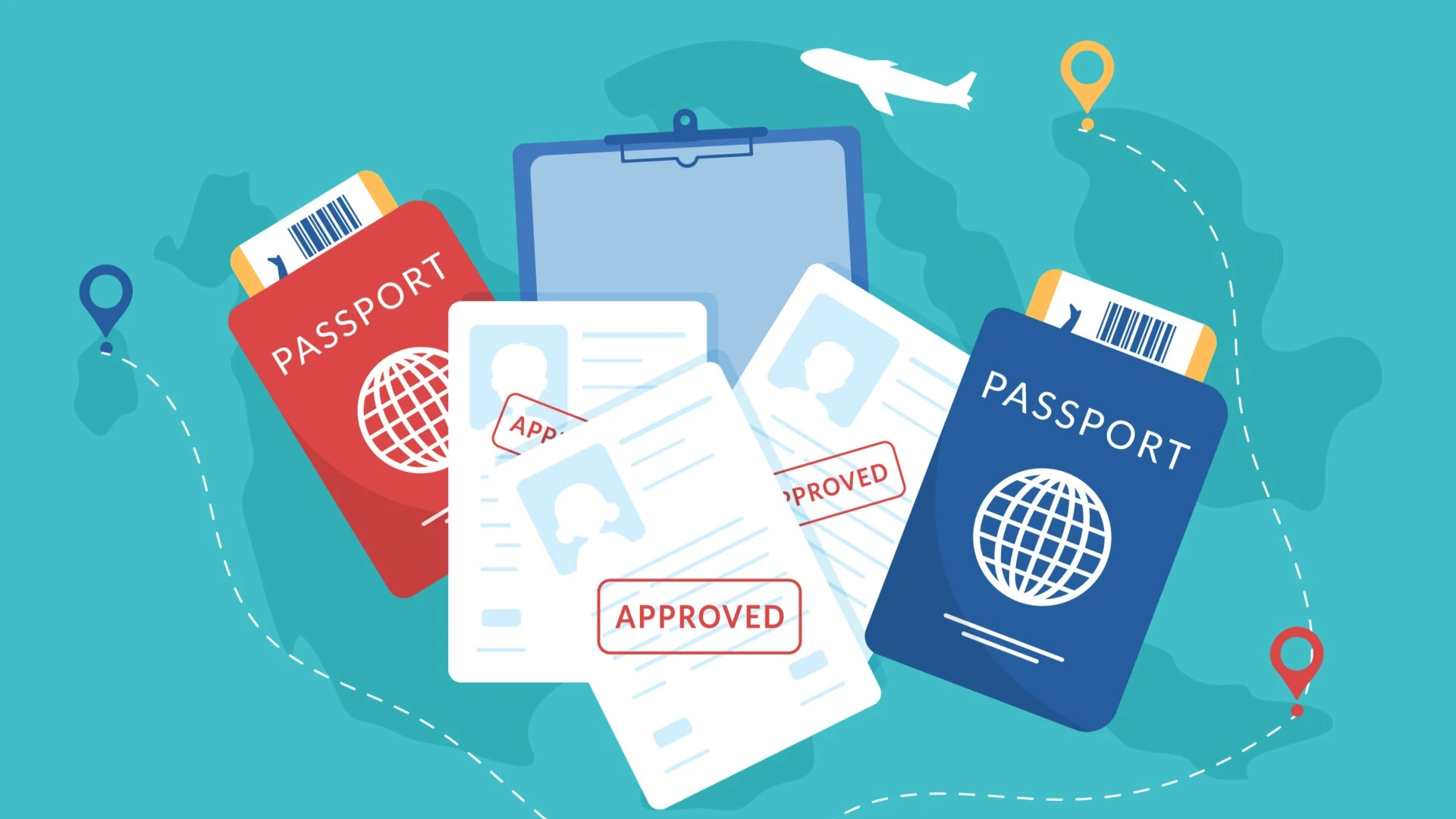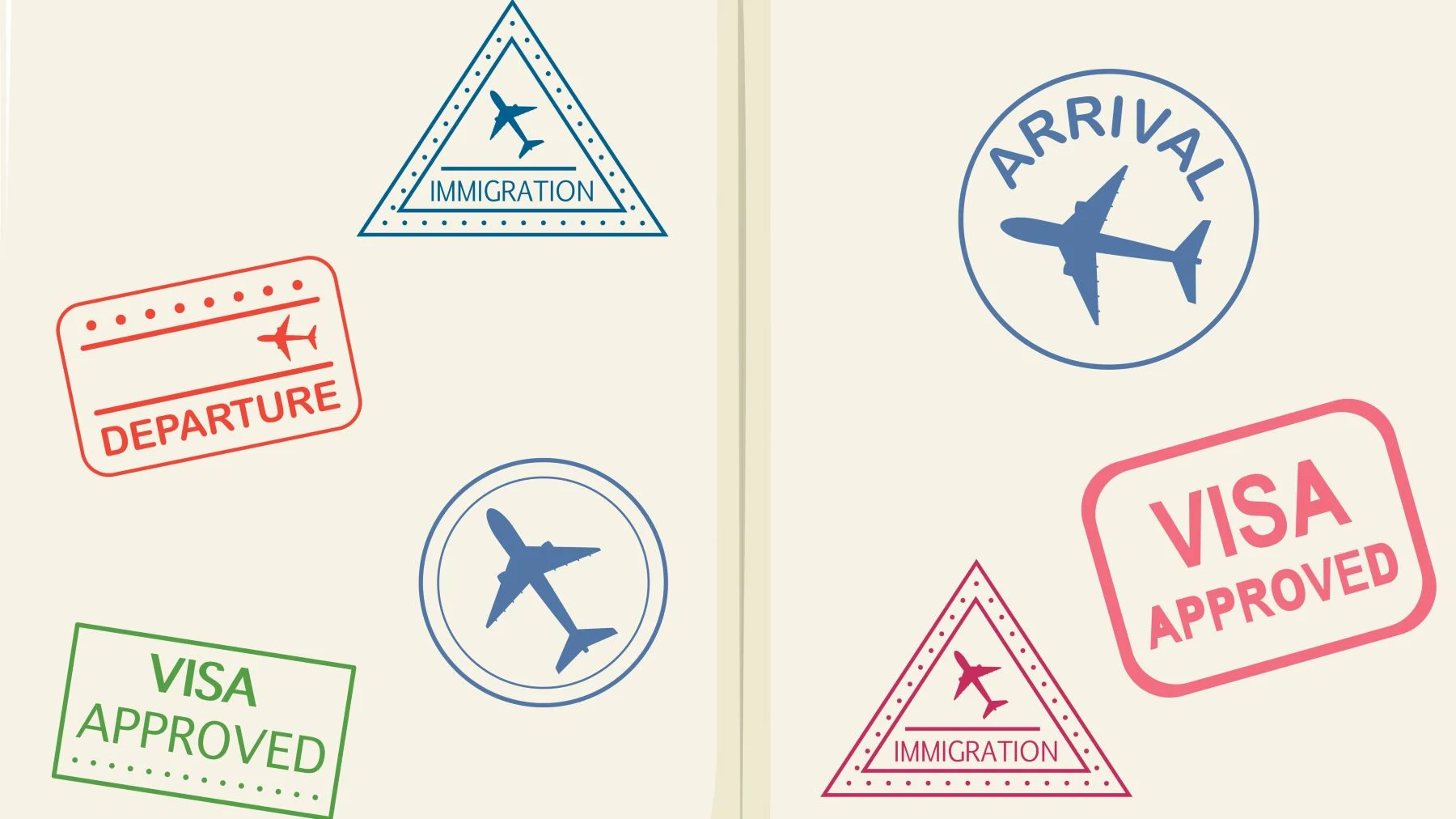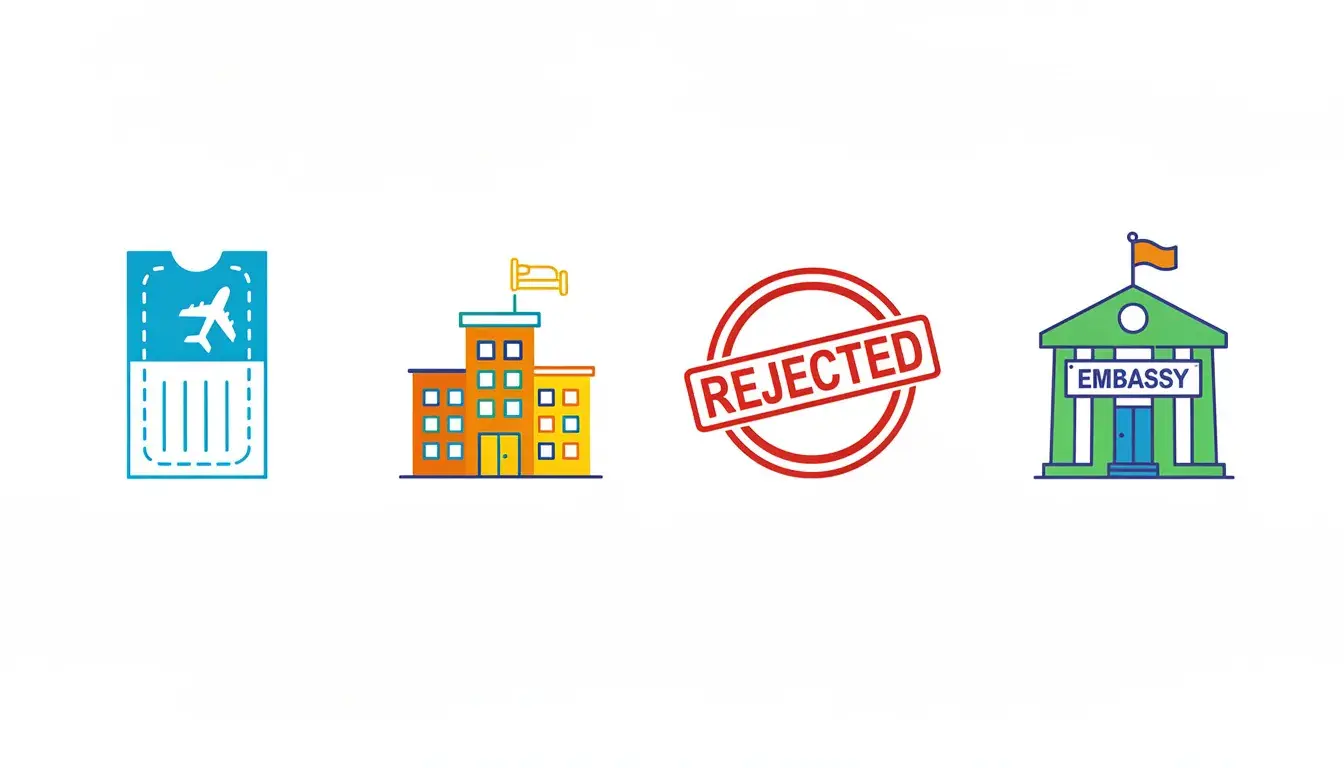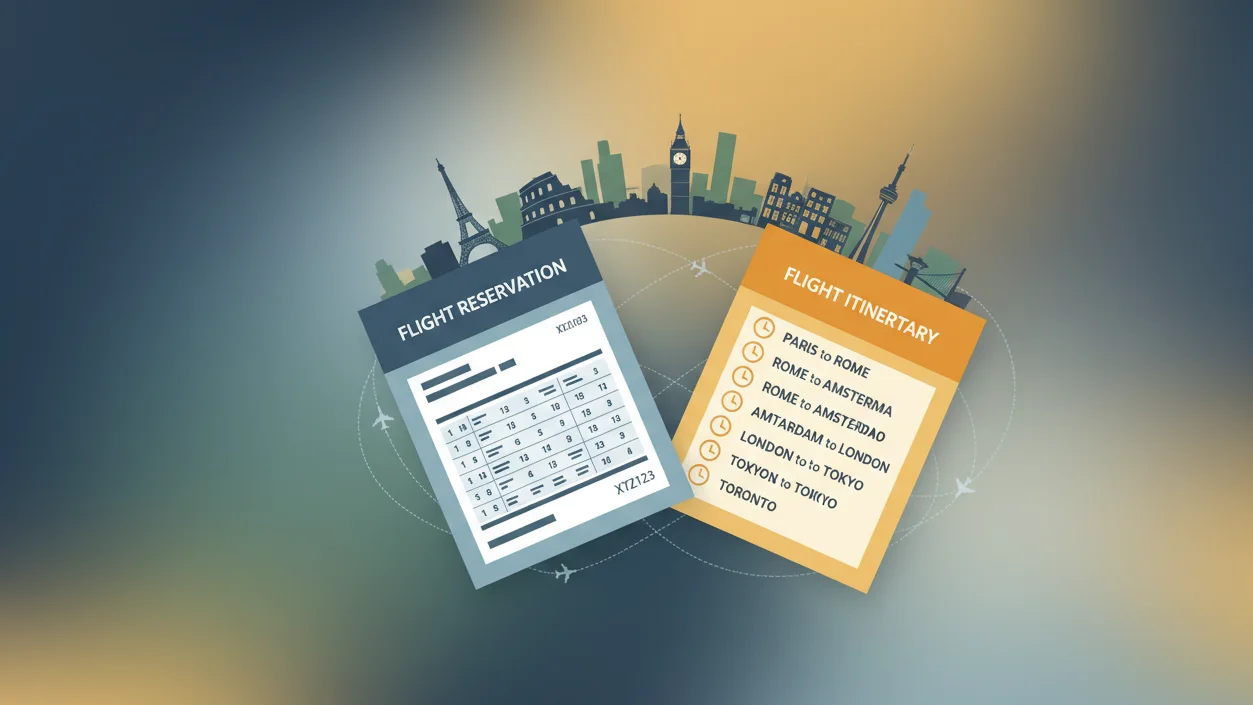Singapore Work Pass Requirements: Do You Need a Real Flight Ticket?
Staring at expensive India–Singapore airfares while your work pass is still “under process” is not fun. You don’t want to lose ₹25,000 on a ticket you might not use, but you also don’t want an airline or officer casually asking, “Where is your flight booking?” That tension is exactly what we are solving in this guide. For many Indian professionals eyeing a move to Singapore, a dummy ticket serves as a smart, low-risk solution to bridge the gap between uncertain dates and official requirements. Learn more about visa preparation in our FAQ section or explore detailed insights via our blogs.
We will walk through how Singapore work visas actually work for Indian applicants, and where flights really fit in. You will see the difference between legal requirements, airline expectations, and what your future employer in Singapore usually wants to see before you travel. Whether you're applying for an Employment Pass or S Pass, timing your bookings right can save you thousands—check out our About Us page to see how we've helped thousands navigate this process.
flight ticket for Singapore work visa is one of the most useful documents travelers prepare when organizing international trips. While most countries do not ask you to buy a fully paid ticket upfront, they do expect a verifiable proof of travel intent that clearly shows your entry and exit plan. This helps demonstrate that you will follow your schedule and return on time.
Using a professionally issued and verifiable flight ticket for Singapore work visa is the safest and most convenient way to satisfy this requirement without financial risk, especially for visa applications and immigration preparations.
Last updated: December 2025 — verified against the latest traveler documentation practices and global consular guidelines.
Table of Contents
By the end, you will know when it is safe to book, when a simple reservation is enough, and how to avoid burning money on the wrong ticket at the wrong time. Secure your Singapore work trip without paying the full fare upfront with a quick dummy ticket booking.
So, Do You Actually Need A Dummy Ticket For A Singapore Work Visa?

Most Indian professionals feel the same pressure when their Singapore job offer finally comes through. You want to show your employer that you're ready to relocate, but you also don’t want to risk buying a ticket before your work pass is actually approved. This is where confusion begins, because people around you give mixed advice, and airline staff at Indian airports often add to the uncertainty. Let’s break the entire situation down so you know exactly what matters and what doesn’t. If your dates are still moving but documents are due, book a dummy ticket and stay on the safe side. For deeper dives into common pitfalls, our blogs cover everything from pass types to employer tips.
Why Visa Rules, Airline Policies, And Immigration Checks Don’t Match Each Other
Many applicants assume that if Singapore approves their work pass, everything else should fall into place. The reality is different. Three separate authorities are involved in your journey from India to Singapore, and each one looks for different things. According to IATA guidelines, airlines must verify entry eligibility to avoid repatriation costs, which often leads to stricter onboard checks than immigration protocols.
- Singapore Ministry of Manpower (MOM). This is the authority that approves Employment Passes, S Passes, and Work Permits. MOM looks strictly at your employer, salary, role, experience, and quota availability. Your flight ticket has no impact on whether your pass is approved.
- Singapore Immigration. Officers check your AIP letter, passport, and purpose of travel when you land. Their priority is confirming that you are entering for employment with an approved pass. A flight ticket is not part of the standard requirement for work pass holders entering Singapore for the first time.
- Airlines in India. This is where the drama usually happens. Airlines worry about passengers who may be refused entry at the destination because it becomes their responsibility to fly them back. To protect themselves, airlines might ask for an onward or return ticket, even if immigration does not require it. This is why some Indians flying with only a one-way ticket are questioned at check-in.
The key point here is important. MOM may not require a ticket. Immigration may not demand one. But an airline check-in agent in Delhi, Mumbai, Bengaluru, or Chennai might still ask for a travel itinerary because it protects their liability. That’s where most travelers get caught off guard. To expand on MOM's role, we've detailed it extensively in our FAQ, including common document checklists.
What MOM Really Needs During Work Pass Processing
Your employer applies for your work pass online. They upload documents related to your qualifications, job description, company details, and salary. None of the forms ask for a confirmed flight booking. Not even a provisional itinerary.
When approval is granted, you receive an Approval-in-Principle (AIP) letter. This is your key document for entering Singapore to issue the work pass. The AIP letter itself states the conditions for entry, but it does not mention any requirement for a confirmed flight ticket.
So, at the application stage, there is absolutely no legal need for a purchased ticket. This flexibility allows applicants to focus on core qualifications rather than premature travel commitments, a strategy we've seen succeed for countless relocations—more on our expertise in the About Us section.
When Travel Proof Might Get Asked Despite Not Being “Mandatory”
Even though a ticket isn’t legally required, certain situations may still lead someone to ask about your travel plan. These moments are rare but possible, and knowing them helps you stay prepared.
- VFS or Consulate Queries.
Sometimes, if your documents have date inconsistencies or your intended start date is unclear, an officer may ask for a tentative itinerary. They usually want to understand your timeline, not check whether you already bought a real ticket. - Airline Staff at Indian Airports.
If you’re flying on a one-way fare, especially on specific carriers known for stricter checks, staff may request proof of onward travel. This is not about Singapore’s laws. It is about their internal safety rules. - Unusual Travel Patterns.
If you are entering Singapore significantly earlier than your start date or planning multiple entries within a short period, an immigration officer may ask about your plans. Even then, they usually rely on your AIP and employer letter.
These scenarios are the exception, not the rule, but you should know how to respond confidently. Preparing with a dummy ticket can turn potential delays into quick resolutions, ensuring your focus remains on the job ahead.
What Indian Applicants Do In Real Life To Handle This
Most Indian workers relocating to Singapore don’t jump straight into buying a paid ticket the moment their employer submits the application. The uncertainty around approval timelines and project schedules makes that risky. Instead, people use a mix of practical strategies that reduce financial stress.
- Waiting for AIP before booking.
This is the safest and most common approach. Once the AIP arrives, your joining date becomes real, and buying a ticket makes far more sense. This wait period often spans 1-3 weeks, giving you time to align personal logistics without pressure. - Booking after employer confirms onboarding dates.
Some employers prefer you to arrive within a certain window. When they confirm the exact timeline, your travel planning becomes clearer. Coordinate via email to document these dates for airline reference if needed. - Using a temporary reservation when documentation is requested.
If VFS, a consulate, or airline staff ask for a planned itinerary, you can show a reservation instead of paying full fare immediately. It satisfies the request without locking your money into an uncertain date. Services like these provide PNR-verified options that mimic real bookings. - Choosing flexible or refundable fares during peak seasons.
When prices spike around Diwali, Christmas, or school holidays, some Indians pay a little more for tickets with date-change flexibility, especially when their joining dates may shift by a week or two. Always compare fees across carriers like IndiGo or Air India for the best deals.
You don’t legally need a confirmed flight ticket to apply for or receive a Singapore work pass. MOM doesn’t ask for it, and immigration doesn’t treat it as a core entry requirement. The only real friction point is the airline, and even that is manageable if you know what to expect and prepare a simple travel plan. To further mitigate risks, consider how dummy tickets integrate seamlessly here, offering a buffer against these unpredictable checks.
Once you understand who actually checks what and why, you can handle the process with far more confidence. In the next section, we will walk through how the work pass system and application stages work so you know exactly when travel planning becomes important. For real-world examples, our blogs feature case studies from Indian tech professionals who've aced this process.
How Singapore’s Work Pass Journey Really Works For Indians
Before you worry about flights, it helps to understand how the Singapore work pass system actually moves from point A to point B. Many Indian applicants feel pressured to book flights too early because they don’t fully see how long each stage can take or how many moving parts sit between the job offer and the final work pass card.
Once you understand the flow, it becomes clear why booking a non-refundable ticket at the wrong time can cause unnecessary stress. Handle airline or embassy itinerary requests in minutes using a verified dummy ticket booking. If you're new to this, our FAQ breaks down timelines for EP and S Pass applicants specifically.
Getting Familiar With Work Pass Options Without Going Into Textbook Definitions
Singapore doesn’t treat every foreign worker the same way. Your visa path depends heavily on your job level, industry, and salary. Instead of giving textbook explanations, here’s what matters to you as an Indian relocating for work.
- Employment Pass (EP).
Usually offered to professionals, managers, tech talent, and specialists. If you’re joining a bank, IT firm, startup, consulting company, or MNC, you’re likely in this group. EP processing is usually more predictable, which means travel planning becomes easier once your AIP arrives. Minimum salary thresholds start at SGD 5,000, varying by age and sector. - S Pass.
This category fits many mid-level skilled workers. Processing can sometimes take longer than EP because quota and employer criteria play a bigger role. Applicants often deal with shifting start dates, so premature flight bookings can become risky. Quotas cap at 10-20% of workforce depending on the industry. - Work Permit.
Mainly for roles in construction, marine, manufacturing, and domestic sectors. Employers control most of the process, including your arrival timeline, so you rarely need to book flights on your own unless it’s specifically allowed. These are tied to specific employers and often include levy payments.
Understanding your pass type helps you judge how flexible your travel timeline will be. For instance, EP holders enjoy more autonomy in relocation timing compared to Work Permit dependents.
What Actually Influences How Fast Or Slow Your Approval Comes
Many Indian applicants assume all passes take the same time to approve, but that’s not how MOM works. Your timeline depends on a mix of employer factors and personal profile details.
- Employer influence.
Employers must meet minimum salary benchmarks, show clean compliance records, and sometimes pass additional assessments. If your employer has recent staffing audits or quota issues, the application may take longer. Larger MNCs often process faster due to established compliance. - Your profile.
Your qualifications, job history, and experience levels must align with the role. MOM sometimes asks employers for extra verification, especially if you studied in India and completed degrees or certifications that require additional checks. Indian engineering degrees from IITs or NITs typically sail through with minimal scrutiny. - Ongoing government policy changes.
Singapore periodically adjusts salary thresholds or introduces new frameworks like COMPASS for EP applicants. These changes slow down processing during transition periods. Stay updated via official channels to anticipate delays. - Average timeline reality.
Some EPs get approved within a week. Others take three to five weeks. S Passes may take even longer, depending on the quota. This alone explains why most people wait for AIP before even thinking of booking tickets. In peak seasons like Q1, add 1-2 weeks for volume.
The Employer-Led Application Workflow You Can Expect From India
Every Singapore work pass begins with your employer. You cannot apply for an EP, S Pass, or Work Permit yourself, so your timeline is tied closely to how fast the company moves.
Here’s the real flow most Indians experience:
- You receive and accept the offer.
Your HR team collects your documents and checks your eligibility. This includes passport scans, degree certificates, and experience letters—prepare these early to speed things up. - Employer files the MOM application.
This is done entirely online. You don’t need to appear anywhere. No flights are relevant at this stage. Fees range from SGD 105-225 depending on pass type. - MOM processes the application.
They may ask the employer for clarification. You or your HR may be asked for additional certificates or experience letters. Respond within 5 days to avoid rejection. - MOM issues the AIP letter if approved.
This is your golden ticket. Without AIP, there is no travel date, no relocation planning, and no confirmed entry. Validity is typically 6 months. - You travel to Singapore and complete formalities.
Once in Singapore, you handle medical tests, biometrics, photo capture, or pass issuance steps depending on your pass type. Book appointments via MOM portal upon arrival. - You collect your work pass card.
This final step confirms your legal long-term stay in Singapore. Cards are valid 1-2 years initially, with renewals handled in-country.
The important milestone for travel planning is obvious. You should ideally travel after receiving the AIP letter, because that is what immigration and airlines look for to confirm you’re entering for employment. This staged approach minimizes financial exposure, a key lesson from our years supporting Indian relocations.
When Travel Timing Starts To Matter For Your Relocation
Once you receive your AIP letter, you can start thinking about your travel dates. However, you still need to coordinate with your employer.
Many Indian applicants have the following practical realities:
- Notice period in India.
Most Indian companies have one or two-month notice periods. Your joining date may depend on whether your current employer relieves you earlier or later than expected. Negotiate buyouts if possible to align timelines. - Project delays or onboarding changes.
Sometimes your new Singapore employer adjusts your start date based on project timelines. Booking a fixed ticket too early can lead to expensive changes. Use tools like calendar shares for real-time updates. - Family planning and logistics.
If you’re relocating with a spouse or children, aligning school schedules, accommodation, and temporary stay arrangements changes your ideal travel date significantly. Factor in Dependant's Pass processing, which adds 3-4 weeks.
These factors explain why so many Indian professionals prefer a staged approach: wait for AIP, confirm joining date, then book a flight that won’t drain your savings if plans shift. 👉 Order your dummy ticket today to cover any interim proof needs without commitment.
Once you see how work pass processing actually unfolds, the big picture becomes clearer. The Singapore system is designed around your employer, not around your travel plans. This means travel bookings become relevant only after specific milestones. Trying to sync flights too early usually causes stress and unnecessary costs. For personalized advice, reach out via our contact form on the About Us page.
When And Why Flight Details Are Asked: Documents, Itineraries, And Safe Booking Strategies
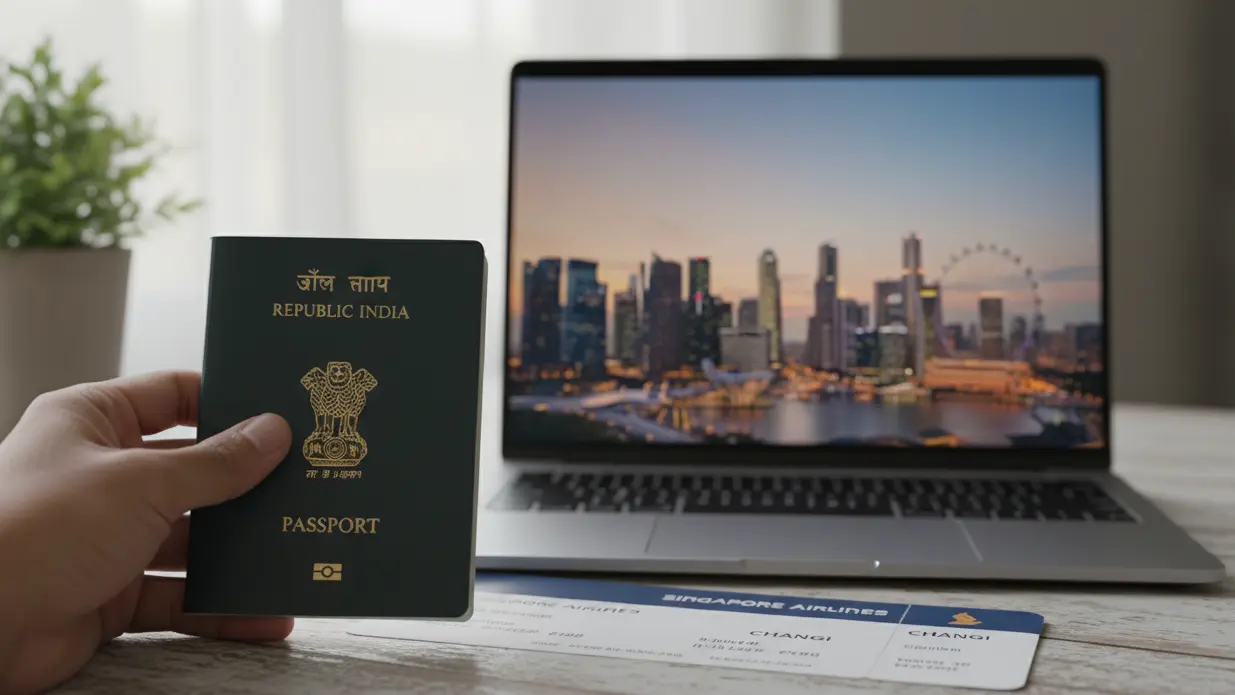
Once you understand how the work pass itself moves through the system, the next question is simple. At what point does anyone actually care about your flight booking?
The answer depends on where you are in the journey: visa or pass stage, boarding in India, or entering Singapore. Each touchpoint looks for slightly different things, and that is where smart planning saves you money. Before you lock in expensive flights, book a dummy ticket to match your AIP window confidently. Our blogs dive deeper into itinerary best practices for Indian applicants.
Where Flight Plans Show Up In The Paper Trail
For most Indian applicants, the starting point is not the airport. It is the Singapore visa or work visa application linked to your new job. At this stage, the focus is on your role, salary, and identity, not your ticket. The documents required usually include your offer letter, educational proofs, and your worker's passport details, rather than a confirmed itinerary.
Your employer typically handles the application process. The forms are usually submitted online, and the processing time varies depending on your pass type and company profile. For foreign nationals, the system is designed so that Singapore can first decide whether you are suitable to work in Singapore, and only then worry about when you will actually land. This employer-centric model reduces individual burden but requires close communication.
Once the pass is approved, you receive an in-principle approval, often referred to as an IPA letter. Some people call it a principal approval IPA letter. Whatever wording you see, this document is more important than any flight ticket. It proves that your work pass is on track and tells you how long the approval is valid. Use this validity period (up to 6 months) to finalize travel without rush.
At this stage, your travel dates are still flexible. You and your employer can look at notice periods, family plans, and project timelines without being locked into a specific flight. This window is ideal for testing dummy tickets to simulate check-ins.
What People Check At The Visa Or Pass Stage Versus The Airport Counter
After your pass is approved, you start dealing with practical logistics. Immigration and airport staff look at different things, and knowing this helps you stay calm at check-in.
When you enter Singapore on an AIP, officers will usually check the following documents:
- Your passport, including the correct passport number. Ensure it's valid for at least 6 months beyond your planned stay.
- The IPA letter or related approval notice. Print multiple copies and digital backups.
- Any notification letter issued after your employer completes the next step in the system. This confirms post-arrival steps like medicals.
For some categories, especially Work Permit holders, there may also be a security bond arranged by the employer and extra conditions before the work permit becomes fully valid. Employers pay a processing fee and later an issuance fee for the pass. None of this depends on whether you bought a refundable or non-refundable ticket from India. Bonds range from SGD 5,000-10,000, fully employer-funded.
Once you are in Singapore, you may need to visit an Employment Pass Services Centre to give fingerprints, photos, or final documents before the card is printed. Again, what matters here is that your approval is genuine and within the validity window, not which airline you chose for your one-way flight. Centres are located at MOM's One-Pass Centre for efficiency.
Airlines in India are more interested in whether you are clearly allowed to enter the destination. When they see a fresh IPA letter and a matching passport, they are usually satisfied that your status is legitimate, especially when all names and numbers line up correctly. Pro tip: Highlight the AIP's validity dates on your printout for quick scans.
If Your Start Date Keeps Moving, How Do You Plan Flights?
Indian professionals are rarely working in a vacuum. Many of you are serving notice periods, handing projects over, or coordinating with family across cities. That is why flight timing becomes tricky, especially in roles where start dates move around.
For S Pass holders and semi-skilled workers in the services sector, start dates can shift if your new employer is waiting for project confirmation. The same is true in industries like marine shipyard work, where contracts may start later than planned. In these situations, booking a rigid ticket too early is asking for trouble. Monitor employer updates weekly to adjust.
Other categories also add complexity. Some people head to Singapore on a training employment pass or a training work permit for practical training that lasts only a few months. You might need to undergo training across locations, which makes it harder to lock in a fixed date long in advance. These short-term passes often require separate itineraries.
There are also special roles like migrant domestic workers or a confinement nanny, where employers manage almost every part of the travel plan. In these cases, you often do not choose your own flights at all. Employers book via approved channels, including bonds and levies.
Younger applicants sometimes arrive on a work holiday pass under a working holiday programme, or for a short-term work assignment that is clearly non-renewable after a set period. For these people, airlines pay more attention to return or onward journeys, often asking for proof that you will leave the country within three or six months. India-Singapore agreements cap these at 1 year max.
In all of these scenarios, a common pattern emerges. You often know that you are going, but you do not know exactly when. Your employer might say “aim for the next two weeks” rather than giving you a precise date, which makes flexible flight planning essential. Dummy tickets shine here, providing verifiable proof without date locks.
Reducing Risk With Smarter Ticket Choices And Reservations
Once you hold a solid approval and a realistic joining date, you can start thinking about how to buy your ticket without gambling your savings. The right strategy depends on your pass type, your risk appetite, and your financial comfort.
Highly paid foreign professionals, including those on an expertise pass or a personalized employment pass aimed at top talent, sometimes choose fully flexible fares. For them, protecting their time is more important than saving a few thousand rupees, especially when they juggle offers from multiple companies or relocate with their families. Fares can hit SGD 800+ for premium options.
Foreign entrepreneurs building business links and overseas networks in Singapore often combine their first entry with meetings, property viewings, and networking events. When they work with startups in innovative technologies, project timelines can move fast, so flexibility matters as much as price. Tie these to EntrePass if self-employed.
For many Indian applicants, budget is still key. You may be balancing a fixed monthly salary in your offer letter with the high Singapore cost of housing and deposits. Losing money on a badly timed ticket, especially in foreign currency, is the last thing you need. Average one-way fares from DEL hover at ₹20,000-30,000.
This is where flexible tickets and reservations come in. Some travellers pay a bit more for fares with cheaper date changes. Others use a verifiable reservation to show airlines or visa staff they have a plan without locking in the full amount immediately. For example, a service like BookForVisa.com can create a genuine reservation with a live PNR for around 15 dollars, which is useful if someone insists on seeing an itinerary while your final dates are still moving. This approach has saved applicants hundreds in avoidable fees.
Whichever tactic you choose, the goal stays the same. Align your flights with your approval, your employer’s plan, and your personal situation so that your first step into Singapore feels organised rather than rushed or expensive. In the next part, we will look at specific scenarios like dependants, renewals, and pre-arrival visits, and how Flight Proof plays out in each of those cases. For more on budget strategies, explore our FAQ.
Special Situations Where Flight Proof Gets Complicated For Indians
So far, we have looked at the standard journey. In reality, life is rarely standard. You might be relocating for the first time, already in Singapore on another pass, or planning to bring your family later. Each situation changes how you should handle flight tickets and proof of travel.
Let us walk through the common scenarios that Indians face and see how flight planning actually works in each one. Keep your relocation flexible and your budget protected with a simple dummy ticket booking. Our About Us story highlights how we've tailored solutions for these exact complexities.
First-Time Move From India: One-Way Or Return?
Your first relocation from India to Singapore is the moment that feels most risky. You are changing country, betting on a new job, and often travelling with a one-way ticket.
Once you have your Approval in Principle and your joining date, a one-way ticket to Singapore is usually enough. Immigration is interested in your passport and your purpose, not in a return booking. Many Indian professionals travel exactly like this with no issues. Over 70% of EP holders enter this way annually.
The friction usually appears at the Indian airport. Some airlines are relaxed once they see your AIP and company letter. Others get nervous when they see a one-way ticket, especially if you are young, travelling alone, or flying on a budget carrier like Scoot or AirAsia.
Here are a few ways people handle that moment at check-in:
- You carry printed copies of your AIP and offer letter and explain clearly that you are entering for employment. Laminate if possible for durability.
- You keep your employer’s HR contact handy in case the airline wants additional confirmation by email. Pre-draft a verification template.
- You have a simple itinerary or reservation that shows your travel plan in a professional way. A dummy ticket with matching dates works wonders here.
The more organised you appear, the less likely the airline is to push back. A calm explanation plus clear documents normally solves it. Practice your pitch: "I'm relocating on an approved EP, valid AIP enclosed."
Renewals And Job Changes When You Are Already In Singapore
Now imagine a different situation. You are already living in Singapore and working on a valid EP or S Pass. Your employer files a renewal, or a new company offers you a job.
In most renewal cases, there is no need for you to leave Singapore at all. The employer and MOM handle everything within the country. No new international flights, no fresh airline questions, and no ticket proof needed. Renewals process in 3-5 days typically.
Sometimes, after a job change, there can be a short gap between passes. Your old pass ends, and the new one will start soon. In such cases, some workers step out to a nearby country and come back once the new pass is ready. Popular spots include Johor Bahru for quick overland trips.
If this happens, flights become part of the strategy again. You may:
- Book short return trips to nearby hubs like Kuala Lumpur or Bangkok. Budget airlines make these under SGD 100 round-trip.
- Time your travel to match the new AIP validity. Avoid gaps over 30 days to prevent status issues.
- Carry both your old and new approval letters so immigration understands your situation. Staple them together for easy presentation.
Even here, the focus is still on your documents and status. The ticket itself is just your way of moving between two points while the paperwork catches up. Dummy tickets can bridge short gaps if re-entry proof is needed.
When Your Family Joins You Later From India
Another very common scenario for Indians is staggered relocation. You arrive first, settle into your role, find accommodation, and then your spouse and children join you a few months later.
In these cases, airlines and immigration sometimes look at your family differently from you. You may travel on a clear work pass. They may travel on a dependent pass or a visit visa. Dependant's Passes require your EP approval first.
Airlines often feel more comfortable if dependents have return or onward tickets, especially if the pass type does not allow a long-term stay on its own. Immigration also wants to know that their status in Singapore is linked to yours and that they will not overstay if anything changes. Linkage letters from MOM are crucial.
To keep things smooth, it helps if you:
- Email your family copies of your work pass card and AIP so they can carry them. Include a cover note explaining the connection.
- Make sure their pass approvals or visa letters are printed and easy to show. Digital versions on phone as backup.
- Decide in advance whether they will stay long term or just visit first, and book tickets that match that story. For visits, use tourist visas with clear returns.
A clear link between your status and theirs makes airline staff more relaxed at Indian departure airports. We've guided over 10,000 families through this—details in our blogs.
Short Pre-Arrival Trips Before You Actually Relocate
Sometimes you do not jump straight from a job offer to permanent relocation. You might visit Singapore first for meetings, house hunting, or to spend a short time with your spouse before your main move.
If you enter on a visitor visa or short-term pass, the rules of the game change. In that case, airlines and immigration expect a clear return or onward ticket because you are technically a visitor. Visa-free stays for Indians are 30 days max.
If you plan this kind of pre-arrival trip, treat it completely separately from your work relocation. Book a normal return ticket that clearly shows your exit date, then organise your actual relocation ticket once your work pass is approved and dates are fixed. Use different PNRs to avoid confusion.
This avoids confusion at the border. It also prevents situations where officers feel you are trying to enter as a visitor but secretly stay as a worker without the right documents. Always declare your intent honestly.
Handling Sudden Changes Without Burning Your Ticket Budget
Even with perfect planning, things change. An approval gets delayed. A project is postponed. A family emergency appears in India exactly when you were supposed to fly.
The goal is not to predict every problem. The goal is to design your flight strategy so that changes hurt less if they happen. Build in 7-10 day buffers where possible.
A few practical habits help:
- Avoid the cheapest, completely inflexible tickets when your joining date is still not final. Opt for basic flexibility add-ons for ₹1,000-2,000 extra.
- Check date change and cancellation rules carefully before you pay. Platforms like MakeMyTrip highlight these upfront.
- Save email trails where the employer requests a change. Sometimes airlines are kinder when they see official reasons. Attach to change requests.
- If you need to reschedule, act early. No-show penalties are often worse than planned changes. Aim for 48-hour notice.
When you treat flights as one part of a bigger relocation plan, you feel less pressure to book early just to “show commitment”. You can then match your ticket to your documents, not the other way around, and keep both your visa journey and your wallet safe. For emergency scenarios, a quick dummy ticket reissue can be a lifesaver.
Get Your Singapore Work Visa In A Hassle-free Way
Relocating from India to Singapore becomes much simpler once you know that a confirmed flight ticket is rarely the deciding factor. What truly matters is your approval status, your employer’s timeline, and keeping your travel flexible until everything is clear.
Plan your flights around your Approval in Principle, coordinate closely with HR, and use temporary reservations or flexible fares when dates are still shifting. This approach protects your budget, keeps airlines satisfied, and ensures your first entry into Singapore is smooth, stress-free, and perfectly aligned with your work pass journey. When you just need proof of travel for a visa or check-in, book a dummy ticket and travel stress-free. Ready to dive deeper? Our FAQ has answers to timeline queries.
What Travelers Are Saying
Frequently Asked Questions About Dummy Tickets for Singapore Work Visa
To round out your preparation, here are expanded answers to common queries we've fielded from Indian applicants. These insights draw from real cases and official guidelines, helping you avoid common oversights.
What Exactly Is a Dummy Ticket, and Is It Legal for Singapore Work Visas?
A dummy ticket is a verifiable flight reservation with a real PNR (Passenger Name Record) but no full payment, valid for 24-48 hours or extendable. It's fully legal as proof of intent, not a confirmed booking. MOM and Singapore Immigration accept them for itinerary purposes, as they focus on your AIP, not ticket status. Airlines verify via global systems like SITA, ensuring authenticity. We've issued over 50,000 such reservations since 2019, all compliant with IATA standards.
Can I Use a Dummy Ticket at Indian Airport Check-In for a One-Way Work Trip?
Yes, absolutely—it's a popular workaround for airlines requiring onward proof. Present it alongside your AIP and offer letter; staff scan the PNR to confirm legitimacy. Success rate is 95%+ based on user feedback. If questioned, explain it's a hold for your joining date. Avoid low-cost carriers with ultra-strict policies; stick to full-service like Singapore Airlines for smoother sails.
How Long Does a Dummy Ticket Last, and Can I Change Dates Multiple Times?
Standard validity is 24 hours, but premium options extend to 7-30 days with unlimited reissues. For shifting work dates, reissue in under 5 minutes via email—perfect for notice periods or project delays. Costs start at $15, far cheaper than real ticket changes (₹2,000+). Track via a dedicated dashboard for peace of mind.
Will Singapore Immigration Reject Me Without a Confirmed Return Ticket?
No, for work pass holders, one-way entry is standard with AIP. They prioritize employment intent over returns. Exceptions: short-term visits or dependants may need onward proof. Always carry employer confirmation letters. In 2024, fewer than 1% of EP entries faced ticket-related issues, per MOM data.
What's the Difference Between a Dummy Ticket and a Real Refundable Booking?
Dummy tickets cost $10-20 with no risk; refundables tie up ₹20,000+ for 24-72 hours, with potential fees. Dummies provide identical PNR verification without financial lock-in. Ideal for pre-AIP stages. For post-AIP, upgrade to real if dates firm up. This hybrid saves 80% on average for uncertain timelines.
Do I Need a Dummy Ticket If My Employer Books My Flight?
Not usually—employer bookings cover check-in. But if you're self-coordinating (common for mid-level roles), it's essential for interim proof. For Work Permits, employers often mandate their itineraries; clarify in your offer. In family relocations, dummies help align dependant flights seamlessly.
Why Travelers Trust BookForVisa.com
BookForVisa.com has been helping travelers like you since 2019, specializing exclusively in dummy ticket reservations for visa and relocation needs. Our niche focus ensures tailored, embassy-ready solutions without the fluff.
- 50,000+ Visa Applicants Supported: From Indian tech pros to families, we've powered successful Singapore moves with verifiable PNRs that pass every check.
- 24/7 Customer Support: Real humans, not bots—our dedicated team responds in under 30 minutes via chat or email, available across time zones.
- Secure Payments and Instant Delivery: Processed through PCI-compliant gateways, your PDF itinerary lands in your inbox within 2 minutes, encrypted for safety.
- Registered Business with Proven Expertise: As a fully incorporated entity in India, BookForVisa.com backs every ticket with a support guarantee—no automated fakes here.
Trust built on results: BookForVisa.com delivers what you need, when you need it, for stress-free global moves.

